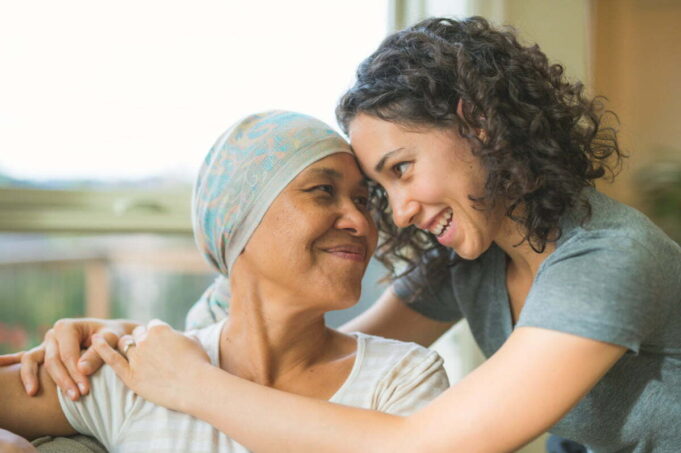Receiving a cancer diagnosis can be an overwhelming and life-altering event. The physical and emotional toll it takes on individuals is immense. During this challenging time, the support of loved ones plays a crucial role in the well-being and recovery of those affected. While medical treatments are essential, emotional support is equally important.
The power of presence, being there for a loved one with cancer, can make a profound difference in their journey. In this blog post, we will delve into the impact of a cancer diagnosis, the challenges faced by patients, and the vital role of presence in providing comfort and reassurance.
Understanding the impact of a cancer diagnosis on individuals
A cancer diagnosis brings forth a whirlwind of emotions for both the individual and their loved ones. Feelings of fear, uncertainty, and sadness are common. It disrupts daily life, shakes the sense of stability, and challenges one’s identity.
Coping with the diagnosis often involves navigating through a range of emotions, including anger, grief, and anxiety. It is essential to recognize the psychological impact of cancer and acknowledge the unique journey each person faces. Understanding their emotional landscape is the first step toward providing meaningful support.
Outline the physical and emotional challenges faced by cancer patients

Cancer brings with it a multitude of physical and emotional challenges. The physical toll of treatments such as chemotherapy, radiation, and surgery can result in fatigue, pain, and a compromised immune system. Additionally, patients often experience changes in their body image and self-esteem, further impacting their emotional well-being.
Anxiety and depression are prevalent among cancer patients, as they grapple with the uncertainty of their prognosis and the fear of recurrence. Recognizing the comprehensive nature of these challenges is crucial in order to provide effective cancer support.
The role of presence in creating a sense of comfort and reassurance
Presence is a powerful tool in providing comfort and reassurance to a loved one with cancer. Simply being there, both physically and emotionally, can create a sense of security and solace. When someone feels seen, heard, and understood, it cultivates a supportive environment that can help alleviate anxiety and stress. The act of being present communicates care, empathy, and love, serving as a pillar of strength for the person facing cancer. The impact of presence extends beyond words, providing an invaluable source of comfort during a tumultuous time.
Exploring the healing power of active listening and empathy
Active listening and empathy are integral components of being present for a loved one with cancer. Listening attentively without judgment allows the person to express their thoughts, fears, and hopes openly. Validating their emotions and experiences creates a safe space for them to process their feelings. Empathy, the ability to understand and share in their emotional journey, fosters connection and support. It is important to remember that offering empathy does not require having experienced cancer firsthand, but rather a willingness to hold space for their emotions.
Practical ways to show presence, such as attending medical appointments

There are numerous practical ways to demonstrate presence in a loved one’s cancer journey. Attending medical appointments together not only provides emotional support but also helps ensure clear communication between the patient and healthcare professionals. Taking notes, asking questions, and advocating for their needs can be immensely helpful. Additionally, accompanying them during treatments or hospital stays can alleviate feelings of loneliness and anxiety. Simple acts of support, such as preparing meals or helping with household chores, can also make a significant impact on their daily lives.
The importance of being available and responsive to their needs
Being available and responsive to the needs of a loved one with cancer is crucial. Flexibility and adaptability are essential as their emotions and physical state may fluctuate. Being responsive entails actively checking in on them, being attuned to their changing needs, and providing assistance when necessary. It is important to respect their boundaries while also being proactive in offering support. Regular communication and open dialogue can help ensure that they feel heard and understood, fostering a sense of connection and trust.
Offering a non-judgmental space for open communication and expression
Creating a non-judgmental space for open communication and expression is vital. Encouraging the person to share their thoughts and concerns without fear of criticism allows for emotional release and validation. It is essential to listen with empathy, withholding judgment or unsolicited advice. Providing validation and support can enable them to navigate their emotions more effectively. Cultivating an environment of trust and understanding encourages open dialogue, empowering them to express their needs and wishes throughout their cancer journey.
Supporting self-care and promoting a healthy lifestyle during treatment

Supporting a loved one with cancer also involves promoting self-care and a healthy lifestyle during treatment. Encouraging them to engage in activities that bring joy and relaxation can help alleviate stress. Assisting with meal planning, exercise routines, and medication management can also contribute to their overall well-being. It is important to be sensitive to their individual needs and limitations while fostering a sense of empowerment in maintaining their health. By supporting their self-care practices, we can contribute to their physical and emotional resilience.
The long-term effects of presence in fostering resilience and recovery
The effects of presence extend far beyond the immediate cancer journey. Research suggests that emotional support can significantly impact a patient’s well-being and even contribute to their recovery. The power of being there for a loved one with cancer can foster resilience, boost their psychological strength, and enhance their overall quality of life. By continuing to provide support even after treatments end, we can help them navigate the challenges of survivorship and promote a sense of hope for the future.
Conclusion: Encouraging readers to embrace the power of presence
Being there for a loved one with cancer is a meaningful and powerful act. The emotional support we offer during their journey can have a profound impact on their well-being and recovery. By understanding the challenges they face, practicing active listening and empathy, and demonstrating practical ways of showing presence, we can create a supportive and comforting environment. Our presence, both physical and emotional, can provide the stability and reassurance they need. Let us embrace the power of presence and stand by our loved ones, empowering them to navigate the difficult terrain of cancer with strength and resilience.















